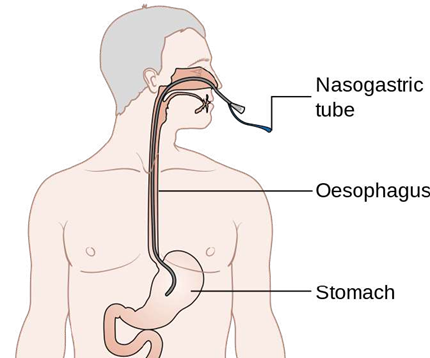The nurse caring for a client reviews the medical record and determines the client is at risk for developing a potassium deficit because of which situation?
History of Addison's disease.
Has sustained tissue damage.
Uric acid level of 9.4 mg/dL.
Requires nasogastric suction.
The Correct Answer is D

Nasogastric suction removes gastric secretions that contain potassium, leading to a loss of potassium from the body. This can cause hypokalemia, which is a low level of potassium in the blood.
Choice A is wrong because Addison’s disease causes hyperkalemia, which is a high level of potassium in the blood.
Choice B is wrong because tissue damage can release potassium from the cells into the blood, causing hyperkalemia.
Choice C is wrong because uric acid level is not related to potassium level.
Uric acid is a waste product of purine metabolism that can cause gout or kidney stones if elevated.
Nursing Test Bank
Naxlex Comprehensive Predictor Exams
Related Questions
Correct Answer is B
Explanation
Hyponatremia is a condition where sodium levels in your blood are lower than normal. This can cause symptoms such as nausea, headache, confusion, muscle weakness and seizures. A hypertonic saline solution is a fluid that has a higher concentration of sodium than normal blood. It can help restore the sodium balance and prevent or treat the complications of hyponatremia.
Choice A is wrong because restricting fluid intake may not be enough to correct severe hyponatremia and may worsen the symptoms if the cause is sodium loss.
Choice C is wrong because encouraging increased fluid intake may further dilute the sodium levels and worsen the condition.
Choice D is wrong because administering a loop diuretic may increase the urine output and cause more sodium loss, leading to more severe hyponatremia.
Normal ranges for blood sodium levels are between 135 and 145 milliequivalents per liter (mEq/L).
Correct Answer is ["23"]
Explanation
The correct answer is 22.5 mL.
To find the amount of mL, use the formula: (desired dose / available dose) x available volume.
In this case, desired dose = 30 mEq, available dose = 20 mEq, and available volume = 15 mL.
Plug these values into the formula: (30 mEq / 20 mEq) x 15 mL = 22.5 mL.
However, since the instructions say to round to the nearest whole number for adult clients, the final answer is 23 mL.
Whether you are a student looking to ace your exams or a practicing nurse seeking to enhance your expertise , our nursing education contents will empower you with the confidence and competence to make a difference in the lives of patients and become a respected leader in the healthcare field.
Visit Naxlex, invest in your future and unlock endless possibilities with our unparalleled nursing education contents today
Report Wrong Answer on the Current Question
Do you disagree with the answer? If yes, what is your expected answer? Explain.
Kindly be descriptive with the issue you are facing.
